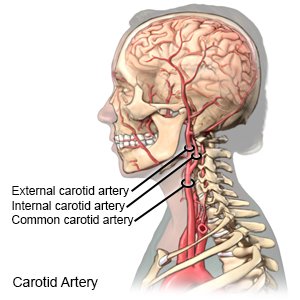Tcar (Transcarotid Artery Revascularization)
Medically reviewed by Drugs.com. Last updated on Aug 4, 2025.
What is transcarotid artery revascularization (TCAR)?
TCAR is surgery to widen a carotid artery that is narrowed from plaque. You have a carotid artery on each side of your neck. Each supplies your brain with blood. Plaque is cholesterol and other substances that clump together and fill the artery. Plaque may build up and decrease or stop blood flow to your brain. A piece of plaque may also break free and cause a stroke.
 |
How do I prepare for TCAR?
- Your surgeon will tell you how to prepare. You may be told not to eat or drink anything after midnight on the day of surgery. Arrange to have someone drive you home when you are discharged.
- You will need to take aspirin and another type of antiplatelet medicine several weeks before surgery. You will also need to take medicine to control your cholesterol level. Your surgeon will tell you when to start taking these medicines.
- Tell your surgeon about all medicines you currently take. Your surgeon will tell you if you need to stop any medicine for surgery, and when to stop. Your surgeon will tell you which medicines to take or not take on the day of surgery.
- You may need blood tests before surgery. You may also need an ultrasound, CT scan, or MRI. Tell the healthcare provider if you have ever had an allergic reaction to contrast liquid. Do not enter the MRI room with anything metal. Metal can cause serious injury. Tell the provider if you have any metal in or on your body.
Related medications
What will happen during TCAR?
- You will be given general anesthesia to keep you asleep during surgery. Your surgeon will make a small incision just above your collarbone, over the carotid artery. The artery will be clamped so blood cannot flow through it during this surgery. Blood will continue to flow to your brain through the other carotid artery and other smaller blood vessels. Your surgeon will make a small hole in the carotid artery. A catheter (tube) will be put into the carotid artery through the hole. A catheter will also be put through the skin in your thigh and guided into a femoral vein.
- A device called a sheath will be connected to another sheath, placed in the femoral vein. The carotid artery will then be clamped just below the catheter site. Blood will be directed to flow backward, away from your brain. This keeps pieces of plaque from breaking off and flowing to your brain during surgery. Blood will also flow into a filter system outside your body. The filter removes any pieces of plaque that break off during surgery. The filter system will be connected to the catheter in your femoral vein. Filtered blood will be put back into your body through this vein.
- Your surgeon will use small wires to cross the narrowed part of the carotid artery. A balloon may be used to push plaque against the carotid artery wall. A stent will then be guided into place and expanded against the artery wall to widen it. A stent is a small metal tube that widens a blood vessel. The stent will stay in place permanently to help blood flow through the artery. The stent will also keep plaque from breaking off and flowing to your brain.
- The clamp will be removed from the carotid artery. The catheters will be removed when blood flows through the carotid artery in the correct direction again. Your surgeon will use stitches to close the hole in your carotid artery and the incision in your neck. Pressure will be applied to stop any bleeding from the catheter sites. The sites will be covered with bandages to prevent an infection.
What should I expect after TCAR?
- You will be helped to walk around soon after surgery to help prevent blood clots.
- You will need to stay in the hospital overnight so healthcare providers can watch for any problems.
- Your surgeon will tell you when you can drive and return to work or other activities. This is usually okay right away.
What are the risks of TCAR?
You may bleed more than expected during or after surgery. You may develop an infection in a catheter site. A hematoma (collection of blood) may form and need to be removed with more surgery. A dissection (tear) may happen in an artery. This can be life-threatening. You will need immediate surgery to fix a dissection. You may still have a stroke during or after TCAR.
Care Agreement
You have the right to help plan your care. Learn about your health condition and how it may be treated. Discuss treatment options with your healthcare providers to decide what care you want to receive. You always have the right to refuse treatment. The above information is an educational aid only. It is not intended as medical advice for individual conditions or treatments. Talk to your doctor, nurse or pharmacist before following any medical regimen to see if it is safe and effective for you.© Copyright Merative 2025 Information is for End User's use only and may not be sold, redistributed or otherwise used for commercial purposes.
Further information
Always consult your healthcare provider to ensure the information displayed on this page applies to your personal circumstances.
